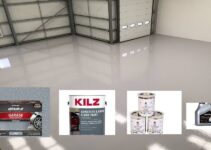Garage Floor Tiles
Garage floor tiles are an excellent way to upgrade the appearance and functionality of your garage. These tiles offer a practical and stylish alternative to traditional concrete floors and can be installed easily and quickly.
With a variety of materials, designs, and colors available, garage floor tiles can be customized to fit your needs and preferences.
Whether you’re looking for a low-maintenance option or a way to add a pop of color to your space, garage floor tiles are an ideal choice.
In addition to their aesthetic appeal, garage floor tiles offer several practical benefits. Firstly, they are easy to clean and maintain, making them a popular choice for busy homeowners.
Unlike traditional concrete floors, which can be difficult to clean and may develop cracks or stains over time, garage floor tiles can be easily wiped clean and are resistant to most stains and spills.
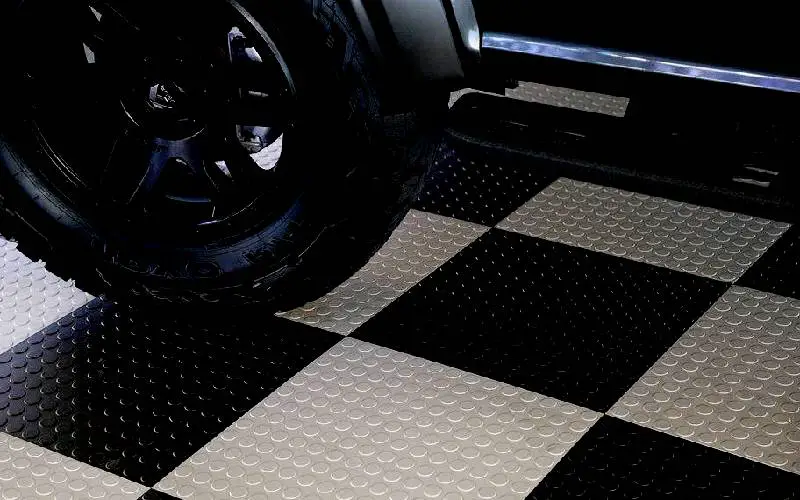
This makes them a great choice for those who use their garage as a workspace, as spills and messes can be quickly and easily cleaned up without causing damage to the flooring.
Another benefit of garage floor tiles is their durability. Most garage floor tiles are made from tough materials that are resistant to heavy foot traffic, impact, and abrasion.
This means that they can withstand the weight of heavy vehicles and machinery without cracking or chipping, making them a practical choice for those who use their garage for storage or as a workspace.
Garage floor tiles also offer excellent insulation properties, helping to keep your garage warm in the winter and cool in the summer.
This can be especially beneficial if you spend a lot of time in your garage or if you have a room above the garage that you want to keep comfortable.
With so many practical benefits, it’s easy to see why garage floor tiles are a popular choice among homeowners.
But with so many different materials and designs available, it can be challenging to choose the right tiles for your space.
In the following sections, we’ll explore some of the most popular types of garage floor tiles and their unique features, so you can make an informed decision about which tiles are right for you.
Read Also:
Types of Garage Floor Tiles
There are four main types of garage floor tiles: interlocking, PVC, epoxy, and rubber. Each type has its own advantages and disadvantages.
1. Interlocking Garage Floor Tiles
Interlocking garage floor tiles are made of durable plastic and are designed to interlock, creating a seamless and stable floor.
They are available in a variety of colors and patterns, making them a popular option for homeowners who want a customized look. Interlocking tiles are easy to install and require no adhesive or special tools.
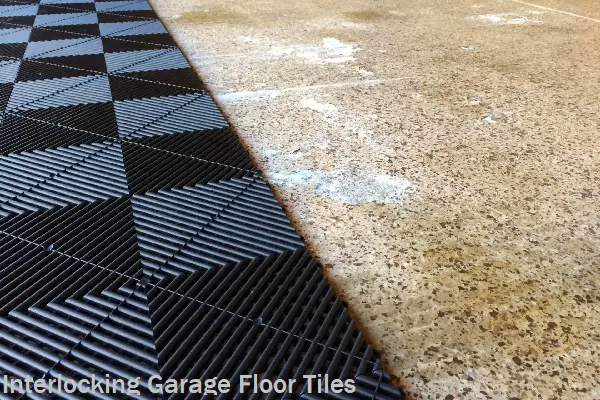
Advantages:
- Easy to install and remove
- Resistant to most chemicals and stains
- Durable and long-lasting
- Slip-resistant surface
Disadvantages:
- Can be more expensive than other types of tiles
- May require occasional re-alignment if they shift out of place
The price of interlocking tiles ranges from $2 to $7 per square foot, depending on the material and quality of the tile.
2. PVC Garage Floor Tiles
PVC garage floor tiles are made of flexible plastic and are designed to provide a comfortable and durable surface for your garage floor.
They are available in a variety of colors and designs and are easy to install. PVC tiles are also slip-resistant and are an excellent option for those looking for a safer garage floor.
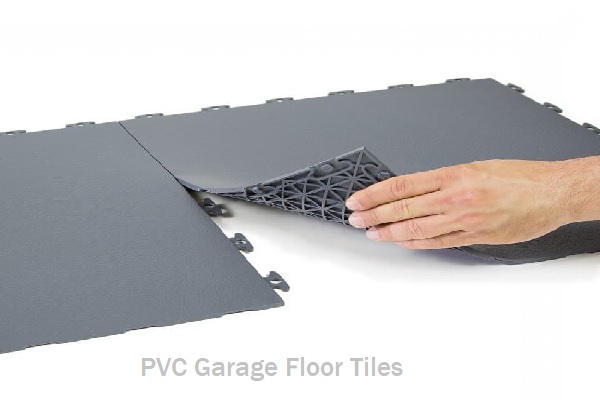
Advantages:
- Easy to install and remove
- Resistant to most chemicals and stains
- Affordable
Disadvantages:
- Not as durable as other types of tiles
- May fade over time
- Not as slip-resistant as other types of tiles
PVC tiles can cost between $2.50 and $7 per square foot, depending on the thickness and design of the tile.
3. Epoxy Garage Floor Tiles
Epoxy garage floor tiles are made of a two-part epoxy mixture and are designed to create a seamless and durable surface.
They are available in a variety of colors and finishes and are popular for their durability and longevity. However, they are often more expensive than other types of garage floor tiles and require professional installation.
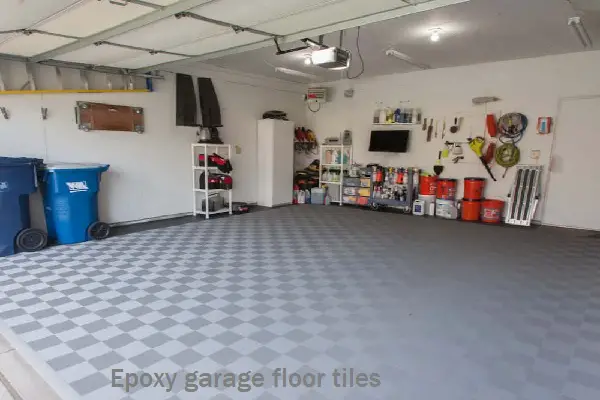
Advantages:
- Durable and long-lasting
- Resistant to most chemicals and stains
- Easy to clean and maintain
Disadvantages:
- Requires professional installation
- Can be expensive
- May peel or crack over time
Epoxy flooring is usually the most expensive option, with prices ranging from $3 to $12 per square foot.
4. Rubber Garage Floor Tiles
Rubber garage floor tiles are made of high-quality rubber and are designed to provide a slip-resistant surface for your garage floor.
They are available in a variety of colors and designs and are easy to install. Rubber tiles are also durable and long lasting, making them an excellent option for those looking for a low-maintenance floor.
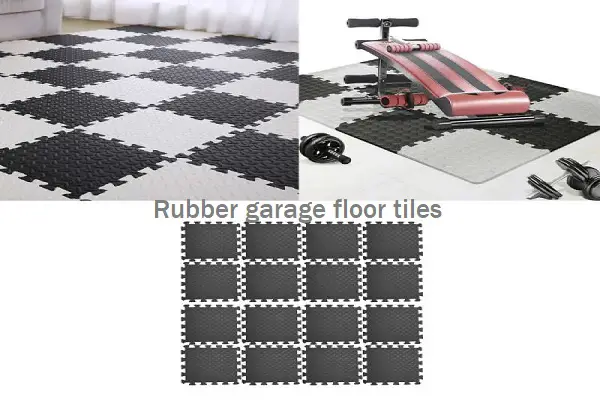
Advantages:
- Slip-resistant surface
- Resistant to most chemicals and stains
- Easy to clean and maintain
Disadvantages:
- Can be more expensive than other types of tiles
- May emit an odor when first installed
- May fade over time
Rubber tiles are usually priced between $2 and $5 per square foot, depending on the thickness and design of the tile.
5. Ceramic Tiles
Ceramic tiles are a stylish and durable option for garage floors. These tiles are typically made from ceramic or porcelain and are available in a range of colors and patterns.
Ceramic tiles can be an excellent option for those who want a more decorative garage floor.
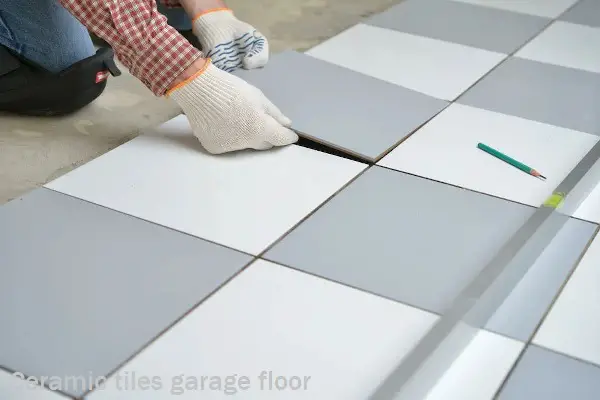
Advantages:
- Stylish and decorative
- Resistant to most chemicals and stains
- Durable and long-lasting
Disadvantages:
- Can be more expensive than other types of tiles
- May crack or chip under heavy foot traffic
- May be slippery when wet
Ceramic tiles can be quite expensive, with prices ranging from $5 to $15 per square foot, depending on the type and quality of the tile.
Read Also: The 10 Best Gym Flooring for Garage Options Your Home
What tile is best garage floor tiles?
The best tile for a garage floor depends on your specific needs and preferences. Interlocking garage floor tiles are a popular choice due to their durability, ease of installation, and slip-resistant surface.
PVC garage floor tiles are also a good option for those looking for a more affordable and slip-resistant floor.
Epoxy garage floor tiles are known for their durability and longevity, but they are more expensive and require professional installation.
Rubber garage floor tiles provide a slip-resistant surface and are easy to clean and maintain. Ceramic tiles are a stylish option but can be more expensive and may crack or chip under heavy foot traffic.
Choosing the Right Garage Floor Tiles
When choosing the right garage floor tiles for your space, there are a few important factors to consider.
1. Durability and Thickness
One of the most critical factors to consider is the durability and thickness of the tiles. Garage floor tiles need to be able to withstand the weight of heavy vehicles and equipment without cracking or chipping.
Thicker tiles are generally more durable, so be sure to check the thickness of the tiles before purchasing.
2. Traction and Safety
Another important factor to consider is traction and safety. Garage floors can be slippery, so it’s essential to choose tiles that offer a slip-resistant surface.
Look for tiles with a textured surface or those that are specifically designed to provide excellent traction.
3. Aesthetics and Design
Garage floor tiles are available in a wide variety of colors, styles, and designs, so consider the aesthetics of your space when choosing tiles.
Whether you want a classic checkerboard design or a more modern look, there’s a tile to suit your style.
4. Price and Installation
Finally, consider the price and installation process when choosing garage floor tiles. Interlocking and PVC tiles are generally the most affordable and easiest to install, while epoxy and rubber tiles may require professional installation and can be more expensive.
How to Install Garage Floor Tiles
Installing garage floor tiles is a straightforward process that can be completed in just a few hours. Here’s a step-by-step guide:
- Prepare the surface: The first step is to clean and prepare the surface of the garage floor. This involves removing any debris, oil stains, or other contaminants that could affect the adhesion of the tiles. You can use a pressure washer or degreaser to clean the floor.
- Plan the layout: Before you start installing the tiles, it’s important to plan the layout of the tiles to ensure that they fit properly and look good. You can use chalk lines or masking tape to mark out the layout.
- Install the tiles: Once you have planned the layout, you can start installing the tiles. For interlocking tiles, simply snap the tiles together and lay them out in the desired pattern. For adhesive-backed tiles, remove the backing and press the tiles firmly into place. For epoxy flooring, you will need to mix the epoxy and spread it onto the floor using a trowel.
- Cut tiles to fit: Depending on the size and shape of your garage, you may need to cut some tiles to fit around corners or obstacles. Use a utility knife or tile cutter to make precise cuts.
- Finish the edges: Once the main area of the garage is covered, you can finish the edges by installing edge pieces or cutting tiles to fit along the walls.
- Allow time to cure: Depending on the type of tiles you have installed, you may need to allow time for the adhesive or epoxy to cure before using the garage. This can take anywhere from a few hours to a few days, so be sure to check the manufacturer’s instructions.
Read Also: How To Inexpensive Garage Organization Ideas
Maintenance of Garage Floor Tiles
Garage floor tiles are relatively low-maintenance, but there are a few things you can do to keep them looking their best.
1. Cleaning the Tiles
Sweep or vacuum the floor regularly to remove dirt and debris. Use mild detergent and water to clean the tiles as needed, and avoid using harsh chemicals that can damage the surface.
2. Preventing Damage
Garage floor tiles are designed to be durable, but they can still be damaged by heavy equipment or sharp objects. Avoid dropping heavy items on the tiles and placemats or furniture pads under any equipment that may scratch or dent the surface.
Conclusion
Garage floor tiles are an excellent investment for homeowners looking to improve the appearance and functionality of their garage.
With so many options available, it’s easy to find a style that suits your needs and preferences. Whether you’re looking for a low-maintenance option or a customized look, garage floor tiles are a practical and stylish choice.
